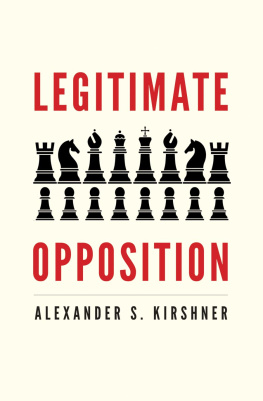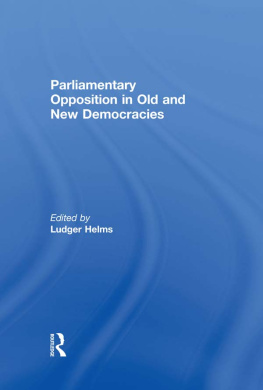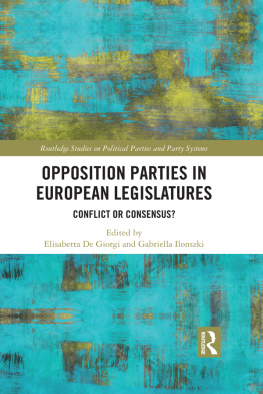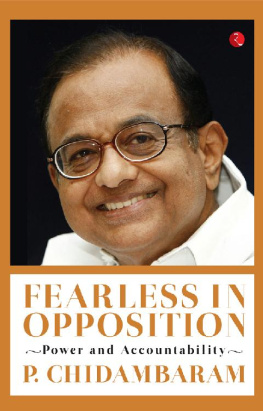Legitimate Opposition

Copyright 2022 by Alexander Kirshner.
All rights reserved.
This book may not be reproduced, in whole or in part, including illustrations, in any form (beyond that copying permitted by Sections 107 and 108 of the U.S. Copyright Law and except by reviewers for the public press), without written permission from the publishers.
Yale University Press books may be purchased in quantity for educational, business, or promotional use. For information, please e-mail (U.K. office).
Set in Minion type by IDS Infotech Ltd., Chandigarh, India.
Printed in the United States of America.
Library of Congress Control Number: 2021952516
ISBN 978-0-300-24346-8 (paperback : alk. paper)
A catalogue record for this book is available from the British Library.
This paper meets the requirements of ANSI/NISO Z39.48-1992 (Permanence of Paper).
10 9 8 7 6 5 4 3 2 1
For Hlne
Contents
Acknowledgments
This book was written in Durham, North Carolina. I am so appreciative of the colleagues, staff, and administrators, too many to list, who have contributed to making this a fruitful environment in which to research, write, and teach. Duke Political Science is a vibrant intellectual community. And I am glad to be a part of it.
I am especially grateful to Michael Gillespie, Ruth Grant, Jack Knight, and Tom Spragens, the pillars of Dukes theory communitya community sustained through their hard work over many years. I have profited personally and intellectually from my ongoing conversations with Michael, Ruth, Jack, and Tom (as well as from their direct feedback on my work). Genevive Rousselire arrived on campus more recently, and I have gained enormously from being her colleague. Jed Atkins and Ian MacMullen, members of our group, also contributed to this project, saving me from many errors. Graduate students have made Duke an exciting place to undertake this project. Thanks to Sam Bagg, Lucy Britt, Judah Buckner, Eric Cheng, Colin Devine, Mike Hawley, Jihyun Jeong, Chris Kennedy, Jacob Little, Antong Liu, Charlie Nathan, Alex Oprea, Wan Ning Seah, Brian Spisiak, Isak Tranvik, Will Wittels, and Somia Youssef. Special acknowledgment is owed to Jeff Spinner-Halev. I rely on him as a political theorist and as a friend.
Significant progress on this project was made while I was a fellow at Princetons University Center of Human Values. My year in Princeton was a thrill. The UCHVs intellectual community is remarkable and inspiring. My work benefited from my interactions with the faculty and fellows. I am indebted to Chuck Beitz, Melissa Lane, Kim Lane Scheppele, Steve Macedo, Alan Patton, Philip Pettit, and Annie Stilz, all of whom made time to discuss this project. Special thanks to Jan-Werner Mller for his intellectual generosity and support. I am obliged to Maureen Killeen for enriching my experience at the UCHV. Thanks are due to the other fellows and especially Nicholas Vrousalis and Claudio Lpez-Guerra. They are impressive political philosophers. I am grateful for their friendship.
Many scholars have given me feedback, advice, and encouragement through this process. I am indebted to Corey Brettschneider, Turku Isiksel, Anthoula Malkopoulou, Russ Muirhead, Shmulik Nili, Andrea Pozas-Loyo, Melissa Schwartzberg, and Ian Shapiro. Thanks also to the Yale University Press and particularly Bill Frucht for guiding this project to completion. I am also grateful to the anonymous reviewers whose suggestions and questions improved the final draft.
In the acknowledgments for my first book, I noted that my family had been growing. Happily, it is even larger now. Thanks to my parents, Judith and Jules, as well as to Franoise and Jean-Raymond. I am grateful to Jessica, Dan, Rebecca, and Evan. My children, lodie and Jules, are magicI am grateful for their silliness and smiles. And, finally, thanks to my love, Hlne, to whom this book is dedicated.
Some material from was previously published in Legitimate Opposition, Ostracism, and the Law of Democracy in Ancient Athens, Journal of Politics 78, no. 4 (2016): 10941106. 2021 Southern Political Science Association. All rights reserved.
Introduction
I n political systems defined by legitimate opposition, those who hold power allow their rivals to peacefully challenge and displace them. And those who have lost power do not seek to sabotage the winners even as they pursue future victories.
Across the globe, legitimate opposition is under assault. Donald Trump, the former president of the United States, refused to acknowledge that he had been defeated by Joe Biden, pressuring state officials and the vice president to subvert the electoral process, stoking unjustified suspicion of his loss, and instigating the ransack of the US Capitol. Were these actions surprising? Not really. Prior to the election, Trump made his intentions evident, insisting he would not accept the outcome were he to lose. And four years earlier, he had famously threatened to imprison his electoral rival, Hillary Clinton. Trump epitomizes the rejection of legitimate opposition. And the threat to the United States system of legitimate opposition may not have subsided. But Trump is hardly a singular example. The governing party of Hungary has deployed the legal and institutional resources of the state to cut the legs from beneath its challengers. Populist parties hostile to practices allowing their opponents to win power are gaining strength all over the world. And the military in Myanmar has just demolished its countrys experiment with competitive elections.
Challenges to the play of legitimate opposition have generated dismay, political conflict, and not a few books about threats to democracy (Snyder 2017; Mounk 2018; Przeworski 2019). At the same time, the imperiled political systems are shockingly imperfect, far distant from our democratic ideals. Consider the United States. In an electorally important districtFloridaformer felons who have completed their sentence are only allowed to vote if they pay a fine. Yet many have no path to ascertaining how much they owe. It is a preposterous, Kafkaesque spin on the practice of electoral democracy. This is not a lonely example with limited implications beyond Florida. Recent years have witnessed successful efforts to make it more difficult for certain citizens to vote, to remove some voters from the voting rolls, to barricade officeholders in power, and to undo the impact of lost elections and referenda (A. Sullivan 2019; Smith 2020; Timm 2019; Maguire 2016; Smith and Davey 2018; Gardner and Rozsa 2020). Mechanisms for distributing political power at the federal and state levels allow minorities to more easily control the course of affairs than majorities (Wasserman 2017; Bronner and Rakich 2021). The infirmity here is not merely institutional. American politicians evidently do not fear that their constituents will punish them for taking the actions just described; their constituents evidently do not prioritize the achievement and maintenance of democracy. And the United States is not unique in this regard.
This is an unsettling moment, one generating discordant responses: reasonable fear that electoral regimes will be undermined; grave dissatisfaction with the undemocratic flaws of the systems under assault. Scholarly and popular works often tackle these issues individually. Some works extol the value of democracy and call for its defense. Others outline all the ways our existing regimes fall short (Levitsky and Ziblatt 2018; Klarman 2020). As I hope to persuade you, this bifurcated approach leads us to misperceive and misunderstand our current moment. Accordingly, I follow a different course. In this book, I try to get my hands around a practice that is fundamental to modern representative governmentlegitimate oppositionand, in doing so, make sense of
Next page









